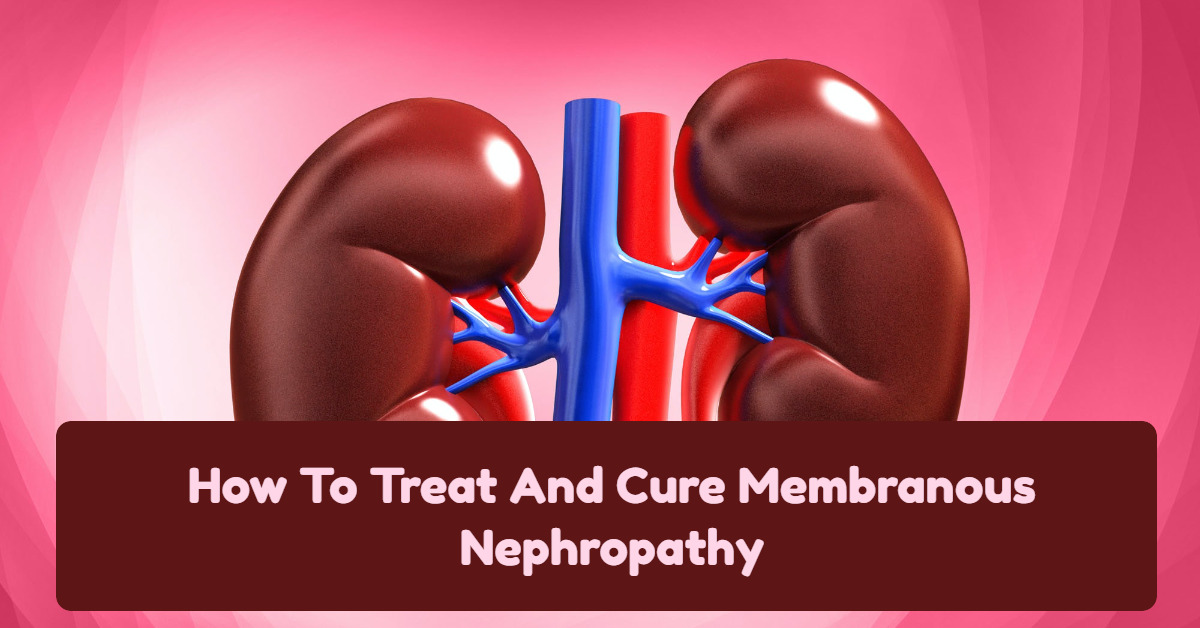How To Treat And Cure Membranous Nephropathy

How To Treat And Cure Membranous Nephropathy: Membranous nephropathy can be a daunting diagnosis for anyone, but there is hope. With the right treatment and care, it’s possible to manage the symptoms and even achieve a cure. EnoughInfo.com

Whether you are living with membranous nephropathy or caring for someone who is, understanding the available treatment options can make all the difference. From medications to lifestyle changes, there are many ways to support kidney health and minimize the impact of this condition. So, let’s dive into the world of membranous nephropathy treatment and discover how to best manage and overcome this challenging condition.
What is Membranous Nephropathy?
Membranous nephropathy (MN) is a condition where the immune system of the body assaults the kidney’s filtration membranes. These membranes remove blood waste from the body. Numerous little filtering organs known as glomeruli make up each kidney. There are just three layers in these filtering units since the blood vessels that make them are so tiny:
- Endothelial cells: On the interior of the blood artery, a single layer of cells is made up of endothelial cells.
- Podocytes: On the exterior of the blood vessel, in a single layer, are these cells.
- Glomerular basement membrane (GBM): Glomerular basement membrane Between the two cell layers lies a thin membrane known as the GBM.
Due to its thinness, the glomerular basement membrane serves as a filter in the body. MN can appear abruptly or progressively deteriorate with time. For many years, some people are unaware that they have the illness. Membranous glomerulonephritis is another name for it. How Do You Treat And Cure Amyloidosis Naturally
FAQs & Answers on How To Treat And Cure Membranous Nephropathy
Can membranous nephropathy be cured?
There is currently no guaranteed cure for membranous nephropathy, but early diagnosis and treatment can help manage the condition and prevent complications.
What medications are used to treat membranous nephropathy?
Medications such as angiotensin-converting enzyme inhibitors (ACE inhibitors), angiotensin receptor blockers (ARBs), corticosteroids, and immunosuppressive drugs may be prescribed to help control blood pressure, reduce proteinuria, reduce inflammation, and suppress the immune system.
Can lifestyle changes help manage membranous nephropathy?
Yes, making lifestyle changes such as maintaining a healthy diet, exercising regularly, and quitting smoking can help reduce the risk of complications and slow the progression of the disease.
What happens when one of these layers is damaged?
The kidneys cannot function properly if inflammation (or anything else) destroys one of these three layers. High quantities of protein can escape from the kidneys into the urine if the podocyte layer is compromised.
Who is prone to membranous nephropathy (MN)?
Membranous nephropathy (MN) can affect anyone, but it is more common in certain groups of people. It is most commonly diagnosed in adults between the ages of 30 and 50, and it affects men more often than women. It is also more common in people of European descent. How To Treat Minimal Change Disease (The Ultimate Guide)
There are several risk factors that may increase a person’s likelihood of developing membranous nephropathy. These include having certain autoimmune disorders, such as lupus or rheumatoid arthritis, certain infections, such as hepatitis B or C, exposure to certain medications or toxins, and having a family history of kidney disease.
It is important to note that while certain populations may be more prone to membranous nephropathy, anyone can develop the condition, and it is essential to receive proper diagnosis and treatment regardless of demographic factors. How to Prevent Osteoporosis from Getting Worse
Symptoms of membranous nephropathy
The major signs and symptoms of MN are caused by protein loss into the urine as a result of damaged podocyte cells. Nephrotic syndrome is the collective name for the symptoms of MN. Nephrotic syndrome symptoms include:
- Edema is fluid-related edema that most frequently affects the legs and feet.
- Elevated cholesterol.
- Lower than common blood protein levels.
- High protein levels can produce proteinuria, which is the appearance of frothy urine.
- Weight increase: Due to the edema, patients typically acquire water weight.
- drowsiness or fatigue.
- a rise in blood pressure, particularly if the kidneys begin to fail concurrently with the MN.
Some MN patients report no symptoms at all. Doctors may detect MN symptoms in some patients during a routine office visit or when running tests for other conditions.
Causes membranous nephropathy (MN)?
It is now understood that an antibody to a protein on the podocyte known as the phospholipase A2 receptor (PLA2R) is what causes the majority of MN cases. The body’s immunological (defensive) system produces an antibody, a protein that typically aids in the fight against infections, in the majority of MN patients. These antibodies attack the podocytes rather than the infection. The proteins are no longer retained by the podocytes in the bloodstream, and they are now allowed to seep into the urine. The major MN is this. MN can also have secondary causes (which are less frequent), such as:
- Lupus is one of several autoimmune diseases when the body destroys its own cells.
- Cancer.
- Certain medications.
- the hepatitis B virus.
- parasitic illnesses, like malaria.
How to treat and cure Membranous Nephropathy

The treatment of membranous nephropathy (MN) depends on the severity of the condition and the underlying cause. Here are some common treatment options:
- Medications: Medications such as angiotensin-converting enzyme inhibitors (ACE inhibitors) and angiotensin receptor blockers (ARBs) may be prescribed to help control blood pressure and reduce proteinuria, which is the loss of protein in the urine. Other medications, such as corticosteroids and immunosuppressive drugs, may be prescribed to reduce inflammation and suppress the immune system.
- Lifestyle changes: Making lifestyle changes such as maintaining a healthy diet, exercising regularly, and quitting smoking can help reduce the risk of complications and slow the progression of the disease.
- Treatment of underlying conditions: If the underlying cause of membranous nephropathy is an infection or a medication, treatment of the underlying condition may help improve kidney function.
- Dialysis or kidney transplant: In advanced cases of membranous nephropathy, dialysis or a kidney transplant may be necessary.
It is important to note that while there is no guaranteed cure for membranous nephropathy, early diagnosis and treatment can help manage the condition and prevent complications. Regular monitoring and follow-up with a healthcare provider is essential for individuals with membranous nephropathy.
Complications That can happen if you have membranous nephropathy (MN)
Membranous nephropathy (MN) can lead to several complications if left untreated or poorly managed. Some common complications include:
- Nephrotic syndrome: Nephrotic syndrome—proteinuria, hypoalbuminemia, edema, and hyperlipidemia—can result from MN.
- Chronic kidney disease: If left untreated, MN can progress to chronic kidney disease, which can eventually lead to end-stage renal disease (ESRD) and the need for dialysis or a kidney transplant.
- Thromboembolism: People with MN are at an increased risk of developing blood clots due to the loss of anticoagulant proteins in the urine.
- Infections: MN can weaken the immune system, making individuals more susceptible to infections, such as urinary tract infections and pneumonia.
- Malnutrition: The loss of protein in the urine can lead to malnutrition and weight loss.
- Hypertension: MN can cause hypertension (high blood pressure), which can further damage the kidneys and increase the risk of cardiovascular disease.
It is important to seek medical attention if you experience symptoms of MN or any of its complications. Early diagnosis and treatment can help prevent further damage to the kidneys and improve long-term outcomes.
How to prevent membranous nephropathy
Preventing membranous nephropathy, an autoimmune disease, is difficult. Treating and managing underlying illnesses may help prevent consequences from them, such as MN, in circumstances when such illnesses are to blame. How STDs Affect The Reproductive System( Sure Tips)
When you should see a doctor
Since a variety of conditions might produce any given symptom, you won’t be able to diagnose MN just on it. If you see inexplicable swelling in your face, arms, or legs, call your doctor.
Conclusion
In conclusion, while there is currently no guaranteed cure for membranous nephropathy (MN), there are many effective treatment options available that can help manage the condition and prevent complications. From medications to lifestyle changes, there are many ways to support kidney health and minimize the impact of this challenging condition.
Early diagnosis and treatment are key to preventing the progression of the disease and improving long-term outcomes for individuals with MN. Regular monitoring and follow-up with a healthcare provider are essential, and it is important to work closely with your healthcare team to develop a personalized treatment plan that addresses your individual needs and concerns. With proper care and management, it is possible to live a full and healthy life with membranous nephropathy.
Recommended:
How to Improve Your Prostate Health (11 Top Tips)
Healthy Aging Tips For Men Over 40 (14 Tips To Stay Healthy)
How Do You Treat And Cure Amyloidosis Naturally




